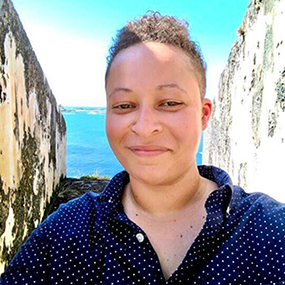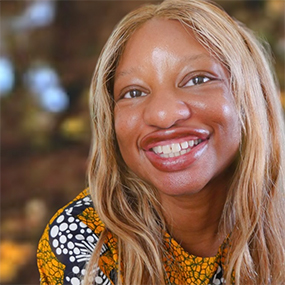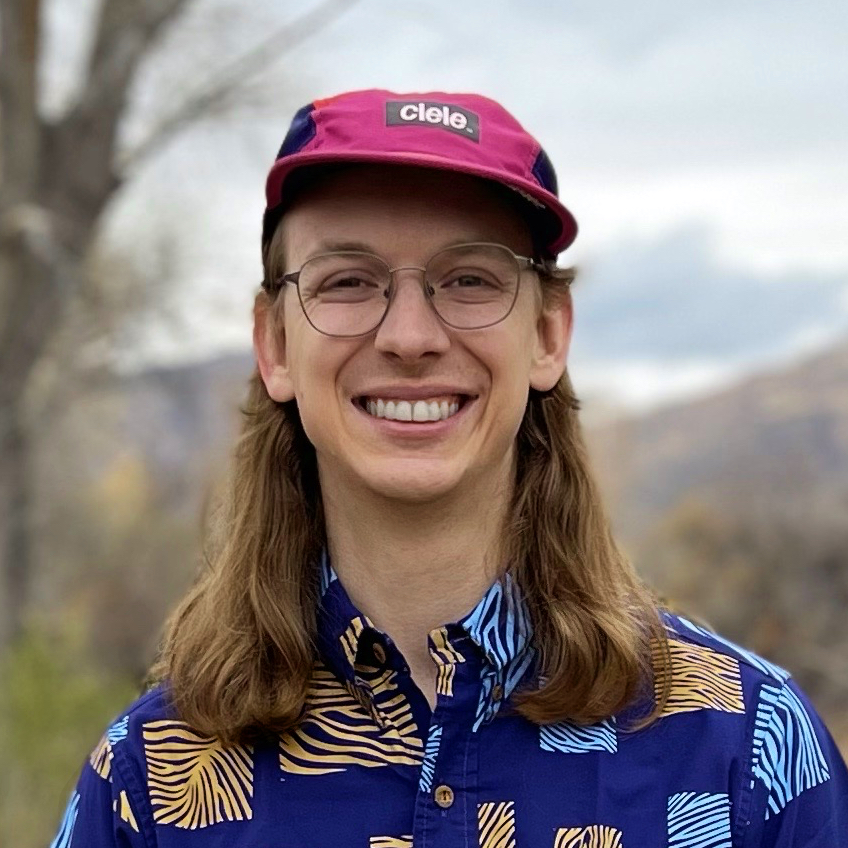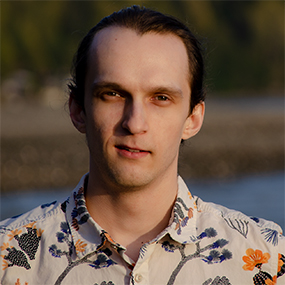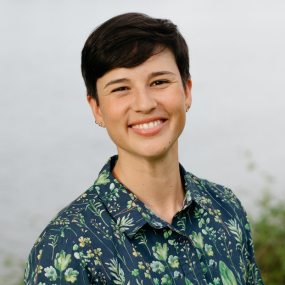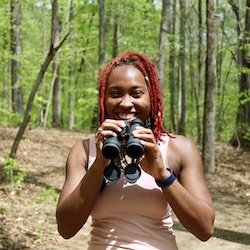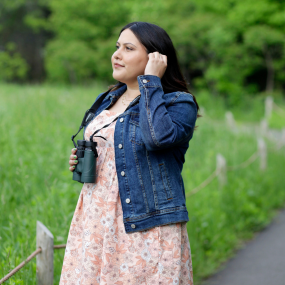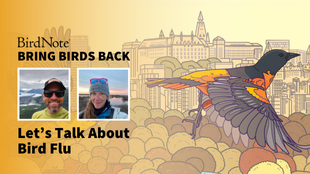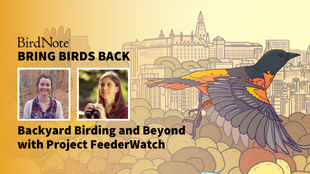

Join BirdNote tomorrow, November 30th!
Illustrator David Sibley and actor H. Jon Benjamin will face off in the bird illustration battle of the century during BirdNote's Year-end Celebration and Auction!
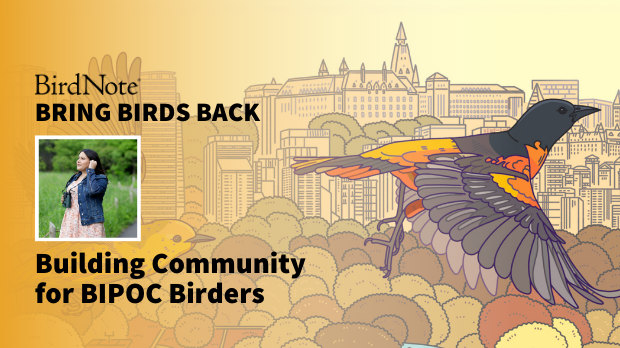
Historically, birding spaces aren’t known to show diverse faces, races and even genders. But for the Chicago BIPOC Birders group, co-founder Daniela Herrera proves that what has always been isn’t always right. In this episode, Herrera shares with our host Deja Perkins why spaces for Black and brown birders are important to have for both safety and community-building. The group’s dynamic and inclusive approach to birding, as well as their grassroots-based structure is not only impressive but inspiring.
For more information about the From Love to Action campaign, visit this page.
Want more Bring Birds Back? Subscribe to our show and follow us on Instagram! For more about BirdNote, sign up for our weekly newsletter. And for ad-free listening and other perks, sign up for BirdNote+ here.
BirdNote is a nonprofit. Your tax-deductible gift makes these shows possible.
Bring Birds Back Special Season 6 is sponsored by the Cornell Lab of Ornithology and the American Bird Conservancy.
Deja Perkins: BirdNote Presents
[Bring Birds Back Stinger]
Deja Perkins: From BirdNote, this is Bring Birds Back. I’m Deja Perkins, your co-host this season, and a geospatial urban ecologist in Raleigh, North Carolina. My work examines the interactions between people and birds in cities. I make maps to find data gaps and to help people monitor their local nature like my favorite neighborhood residents: birds.
[Music begins]
Birds connect people across countries, time zones, languages, and cultural backgrounds. As the birder, poet, and ornithologist J. Drew Lanham once wrote, “Seeing beauty and advocating for justice are not mutually exclusive acts. One can feed the other powerfully.” This is shown in the action of bird lovers. Local fundraising campaigns, native plant sales, backyard wildlife certifications, lights out campaigns, and so much more are all done for the benefit of birds. Bird organizations do a good job of supporting birds– but what does it mean to support the people who love the birds?
For many, birding is about more than just a love and appreciation for our feathered friends, birding also helps build community.
However, finding your birding community can be hard. This gets even more difficult depending on the intersections of your identity. Sometimes, being the youngest birder in the group, the only girl, or the only person of your ethnicity or background isn’t always easy. I‘ve experienced all three.
While most birders can be friendly and welcoming, it can still be an isolating experience if you can’t relate to the existing birding community in your area.
And while birding in itself is not inherently racist, classist, sexist or ableist, birders are still individuals: sometimes the people you encounter in the outdoors can create unpleasant and unsafe environments for you based on their own prejudices and biases.
Safe spaces are not only wanted but needed in environments many might not consider necessary for protection, like the birding community. While many birding groups do an excellent job of supporting the birds we share a common love for, not enough focus on supporting the needs of the birders.
In this episode, we meet Daniela Herrera, co-founder of the Chicago BIPOC Birders– which, in my opinion, is one of the most dynamic and inspiring birding groups around. I’ll talk to Daniela about everything from the issues BIPOC birders face in predominantly white spaces to the unique challenges BIPOC-centered groups face interpersonally– and what she and her fellow birders are doing to change it.
[Music ends]
Deja Perkins: Hi, Daniela. Thanks so much for coming on the show today. Before we get into the creation of the Chicago BIPOC Birders, tell us about how you got into birding in the first place. What’s your origin story?
Daniela Herrera: So, it was a very dreary day. I was on a walk, there's a bird sanctuary called Montrose Point Bird Sanctuary. It's very famous in Chicago amongst birders. And I heard a familiar bird singing and it was so loud and it felt like it was so close to me and I was like, ‘Oh, my gosh!’
[Chickadee song]
And I asked this birder, what is this little bird?
And she was like, ‘Oh, that's a Black-capped Chickadee.’ And I was like, ‘How did you know that?’ And she was like the only other person there with me. It was like a very dreary Chicago day and this bird just brought me so much joy.
I had always heard their song every morning and to be able to, like, see the bird and, like, connect the song to this tiny little bird that's so loud, um, was just like a really magical moment.
[Chickadee calls]
I was happy that someone was there to share in that joy with me.
She talked to me more about some of the birding clubs in Chicago and invited me to the following bird walk. And the rest is history.
Deja Perkins: Oh, I love that story. a lot of times when we are outside on the trail or whenever we're going birding, we come across other birders and usually they're really happy to share, either their sightings or an identification or just even another story of a bird. So I'm really glad that someone was there to help share that moment with you.
So, how did you get from your spark bird to co-founding your very own birding group?
Daniela Herrera: Yeah. So Chicago BIPOC Birders is a collective of Black, Indigenous, and people of color who enjoy birds and love birdwatching. We were created in 2021 out of a bird walk leader training program that was organized by Chicago Bird Alliance. They had a staff member, his name is Antonio Flores, who did a really great job at creating space for Black, Indigenous, and people of color to come together and learn how to facilitate a bird walk and also build community amongst ourselves in a safe space.
And in the background there's all the uprisings that were happening post George Floyd's murder. So, this was a really important space for people of color to come together and be safe in community and then also be safe in health, as well.
So, um, this program was eight weeks long, and at the conclusion of it, so many of us had such a positive experience that we wanted to continue staying in touch. Um, and so we continued to do that through Slack. And we've been able to grow our membership over the last several years.
Deja Perkins:That sounds really great, especially to hear that you all are building this effort collaboratively, building off of one another's strengths.
And one of the most unique aspects about your group is that you all approach and include community in everything that you do. So, can you share a little bit about the different ways that you all implement community into your groups and events?
Daniela Herrera: I don't think we've ever had an event where we don't bring food. Food brings people together and, you know, it creates cohesion and these bird walks are happening at like eight, nine in the morning. Like we try to entice people to come out by being like, ‘Hey, we're going to have some tamales, we're going to have some pan dulce, um, we're going to have coffee, which is the most important thing for so many people. And so we try to encourage people to come with food.
Also, Chicago is a very segregated city. And the green space is also very segregated. There are people that live in Chicago that have never been to the lakefront, that have never been to the free zoo. And one of the barriers to that is transportation because our transportation system is also very segregated and buses don't show up when they say they're going to show up. And so we offer transportation stipends to folks to make sure that, if they want to come birding with us, they can come birding with us.
We also raised a lot of money to purchase binoculars that we share with our community members. And one thing that we do is, we'll count our binoculars at the end of the day to make sure we have them all, but we also don't stress out if we happen to lose one or two at the end of an event. If someone took the binoculars by mistake or because they really wanted the binoculars, honestly, that's a win for us. Because that means that these folks are going to go out and look for birds on their own with the binoculars that they have. And so that's one thing that we're constantly doing is replenishing our binoculars.
We're just trying to meet people where they're at. It takes many forms from doing backyard bird watching to hosting Big Sits regularly, going on accessible walks with people. We focus on if you don't wanna use your binoculars, you don't have to. If you don't have good vision and you prefer to bird by sound, we love that.
And so we really try to center people and their needs and their abilities when it comes to birding.
Deja Perkins: The group has cultivated a long list of birding events that incorporate community in unique ways. Their "Big Sits,” which Daniela mentioned, is also among their most popular and prioritizes all bodies and ages by encouraging a birding meet-up in one particular area where participants bring chairs or blankets to sit comfortably for a length of time, observing birds with one another.
Daniela says part of the reason she became a birding facilitator was because of the various ways these outings allow for connection– physically and emotionally.
Daniela Herrera:So, it's a different experience to facilitate the bird walks than to be part of them, I love birding with new birders. I love birding with children and with families. I love when they are so into nature. It's just amazing. They've never held binoculars. They've never seen a bird through binoculars. But they know so much about the birds already. Like these are like five year olds and then you put the binoculars in their hands and you just see their faces light up with so much joy and they tell you all about the evolution of birds and they want to share everything that they learned and everything that they saw with other people around them.
And I just really appreciate being able to create a space where we can allow for that curiosity and allow for children to take up this space because I feel like so many times we just tell children like, shush, like you can't be loud, you can't do this, you can't do that. And so I really love when children come on these bird walks because it kind of becomes like they're the leader.
I think, a lot of folks, they've reflected back to me that they've just had so much joy in being outside with other people of color. That experience is so rare and they just want to keep doing it more and more. We are very relaxed when it comes to our bird walks, there's no, like, one leader, we try to say. Like, we're facilitating, we're organizing, we're all working together to identify birds and share in that joy.
We host birding events that start at like 6, 7 a. m. you know, it's tough to get up at 6:00 AM 7:00 AM to get out to a birdwalk, and so, we host, like, a lunchtime walk. And then evening bird walks too.
Deja Perkins: That’s a really great idea. What a great way to get people involved who are not traditional birders. So, you all create events for your community year-round.. I can imagine that isn't easy. Are there any specific ways you attempt to get families engaged?
Daniela Herrera:Yeah, I think our most busy time is definitely during spring and fall migration, but we also partner with other organizations, like the Morton Arboretum for their Celebración de los Arboles. [It’s] great for families and is just like a really diverse event that takes place during Hispanic Heritage Month.
There's a park in Chicago called Steelworkers Park that has a large rock climbing wall and folks will climb to the top and watch for birds as they fly over the lake. This was a really great event in the fall during raptor migration. And a Juneteenth event there as well. And folks who don't know how to rock climb can be very supported at that event. Like, I had never rock climbed before and I just felt so safe being there.
We've hosted some foraging and birding walks, we like to get creative. We're waiting to hear back on a grant to see if we could get some transportation - like a van - so that we could all go, up to, like, Midewin or Nachusa Tallgrass Prairie to go birdwatching and also look at the buffalo and also offer people some lunch.
And we're not just birding, we're also looking at plants. We had an event with the Feminist Bug Club in Chicago for World Migratory Bird Day this past spring. The connection was how keeping insects safe and protected will also keep birds safe and protected. So, when you're birding with Chicago BIPOC birders, I feel like there's always something for everyone's interests.
Deja Perkins: For sure. Now, I've been noticing throughout this episode that you, yourself, are bilingual, so can you talk to us a little bit about the bilingual bird walks that you lead?
Daniela Herrera:Yes, how could I forget? So, I speak Spanish– I'm Mexican and so, I organize bilingual, Spanish and English, bird walks throughout the city. We've partnered with Friends of the Forest Preserves of Cook County for several of these events and the goal is really to get more Spanish-speaking folks out into the forest preserves or out into nature.
These events are not for folks who want to practice their Spanish. Even though it's a bilingual event, we really want these events to be for people who, their primary language is Spanish. Because Chicago has a very large immigrant community and a lot of our immigrant communities come from Mexico and Venezuela and South and Central America. And so, we want those folks to come out and go birding with us.
Deja Perkins:That's really awesome.
You mentioned that a lot of participants have said that they really appreciate having a space for birding that is intentionally cultivated for them. Was there a specific event or particular experience that prompted you all to create this affinity space for BIPOC individuals? Because your group is doing something very unique that I haven't really heard about in a lot of other groups. So, what exactly was it that prompted you all to create this space?
[Pensive piano music starts]
Daniela Herrera: Honestly, I think it's just, you know, we're sick of microaggressions. We are sick of racism and misogyny and the harassment that takes place in non-affinity spaces. I don't know if this is a stereotype and I'm feeding into it, but, people of color are loud. [Laughs] You know, we're gonna, like, we're gonna talk and we're gonna laugh and we're gonna celebrate if that's what we're feeling on the inside. And I feel like so many times when you're like on a bird walk that's a more traditional bird walk, it's like everyone has to be quiet, like you can't make any loud noises, you can't make any huge gestures.
I remember one of my friends was telling me that she went on a bird walk – and she was wearing, like, a colorful floral blouse – and she was told that she shouldn't be wearing that because it'll, uh, scare away the birds. [laughs] It's just like all these ridiculous things that aren't true. Like, we are in an urban environment. These birds are used to the background noise of cities, which– yes, traffic noise has been shown to be detrimental to birds. But we've evolved alongside birds, you know, like, they are used to our presence. So, we wanted to have a space where we can be ourselves and we can celebrate together and just be together in community.
Deja Perkins:And personally, I can imagine that these spaces create a sense of safety that allows for a much different experience than you would have elsewhere. So, what experiences would you say stick out to you the most?
A lot of the birders that are Black, Indigenous, people of color– they're so knowledgeable.
There's one person I know, his name is Sammy, he spots a bird so quickly and just is so capable when it comes to like, getting people to get their eyes on a bird. And we all appreciate that so much about him. And, in other spaces where I've been really good at, like, spotting a bird or identifying a bird, like, my knowledge and my identification of a bird is questioned constantly. Like, my knowledge is not taken seriously. But then, like, my white counterpart is like, ‘Oh, look, there's a Scarlet Tanager.’ And it's like, I literally just said that, you know?
There's also the issue of safety in the outdoors. There are trespassing laws that were passed to keep Black folks out of lands that they once tended to.
And we believe that being together and taking up space as a group– it won't help undo the trauma that that has caused but it can help bring our folks closer to nature. And we know that we're there in numbers and there's strength in numbers, and we also have community agreements about what's tolerable and what's not.
[Piano music ends]
I have been sexually harassed at one of my favorite parks when I was there by myself. And it happened more than once by the same person on different occasions and now I can't go to that park.
But if I was with my Chicago BIPOC birders group, I know that they would have said something to this person. I know that they would have checked in to make sure I was okay. I know that they would have followed up with me, and so it's important to have that community that has your back and makes sure that you're safe, respects your knowledge and is humble and knows that while we know a lot, we also don't know everything. And there's room to learn from others as well.
Deja Perkins:That was beautifully said, and I just want to say I'm so sorry that happened to you in a space that once brought you so much joy. I think there is a lot to be said about how these various intersections of our identity can expose us to harm in places that are supposed to bring us joy because of other people.
And I share in a lot of those experiences that you were bringing up. I was in Arizona at a botanical garden on a conference trip with some friends. And I was just so excited to be there and see some birds and we were giggling and laughing and just, like, so excited. And I remember there were these two little old white ladies coming around the corner shushing us and telling us that we're being too loud, we're going to scare the birds and we were just shocked.
It's like no matter where we go, we're still being policed in our actions and what we're doing and how we can experience joy over something. Like you said, those birds are used to people. We're in a botanical garden where they host music events. So, you really highlighted a lot of the different reasons why we need these affinity spaces.
[Music transition]
After these messages, we continue our conversation with Daniela about the Chicago BIPOC Birders, what unique challenges they face building community, and how they advocate for themselves and for Chicago’s birds.
Stay tuned.
MIDROLL
Deja Perkins: We’re back with Daniela Herrera from the Chicago BIPOC Birders. And we’re talking about their distinctive approach to group birding.
So, I'm curious. Were there any particular challenges that you faced in creating this community that you hadn't anticipated?
Daniela Herrera:Yeah, I think that for a long time I had this thought that, well, if we're creating an affinity space that's for Black, Indigenous, and people of color– we've removed whatever we might perceive to be, like, a problem. Like, we've removed the microaggressions. We've removed the racist comments. We should have no conflicts. We should just be able to do everything we want to do without running into any problems amongst ourselves. And that's just not true.
We've had our issues about different ideas for what we want the group to look like, and we had some growing pains around that, but what's important is to have the respect and care for each other.
I think that for affinity spaces, there tends to be conflict because we're all showing up in a space we know that is a little bit safer, but we're also showing up with our baggage, right? And in other spaces, we push that aside and we suppress that part of ourselves because we don't want to be perceived as dramatic or, you know, the tropes of, like, the angry POC. Like, we don't want that. But I think in our space, I hope that folks feel safe enough to show up as their authentic selves and also recognize that we all have growth to do.
So we're like, we're not canceling you if you get mad about something. We're here for you and we're going to work through it with you.
Deja Perkins: Yeah, leaving that space for growth is so important because none of us are perfect. We all make mistakes and being able to have those tough conversations with each other and be able to grow and learn from each other is super important.
Online, your group is described as a grassroots movement, which definitely stands out for a birding group. Can you explain what that means in the context of the Chicago BIPOC Birders?
Daniela Herrera:Yeah, so we are a volunteer-run group. We are not for profit. We are just very dedicated individuals who care about birds and community and culture and care about our roots, and see the intersection of birding and access to nature to so many other things like climate justice, environmental justice, reproductive justice, racial justice. And we wanted to have a space where we can show up as ourselves and build events that are tied to important things that are affecting our loved ones and our communities, while having a safe space to also appreciate nature because we know that nature is also healing.
Deja Perkins:This all sounds like a very people-centered group, doing things that are of importance to your community, and you all take a non-hierarchical approach to leadership. Can you tell us a little bit more about why y’all are choosing that structure?
Daniela Herrera:So, running an organization takes a lot of work and we don't have the capacity or probably even the want to raise the funds to have a full-fledged organization; where you have a board and you have staff. We recognize that people have different interests and different capacities at different times of the year. Having this structure where people can come and go and take as much space in a leadership role as they want, is the best way to allow people to show up and not feel intimidated.
We strongly encourage people to just come to our events. There's no exchange that needs to happen. But, If you feel that your community is lacking in events for people of color, we will work with you to help organize an event as well.
We recognize that people have different strengths, too. Some people are really good at putting together flyers. Some people are really good at just leading a bird walk and helping guide people to get their eyes on a bird. So, we don't want to put out this expectation of ‘you have to do this,’ because I feel like that pushes people away from being able to participate when they can.
Deja Perkins: With this non-hierarchical approach — you have so many community members and different interests in events, how do you all decide which ones to prioritize?
Daniela Herrera:All of our events are put together by volunteers, and they're meant for the people that that organizer is a community member of. So we'll host events around holidays that are important to people, like for Lunar New Year.
And then we also do events that are advocacy-based.
[Music fades in]
So one of our members, Nancy, has been organizing around missing, murdered, and Indigenous women to bring attention to that tragedy and the fact that so many of our Indigenous siblings have gone missing and have not been found.
Deja Perkins: Nancy Medrano, fellow organizer of the Chicago BIPOC Birders, in partnership with the National Indigenous Women’s Resource Center has helped to spread their Missing and Murdered Indigenous Women and Relatives movement locally.
Their focus has been the disappearance and unresolved murders of Native women and children– often underreported and misrepresented in public records. For example, in 2016, more than fifty-seven-hundred Native American and Native Alaskan women were filed as missing… - but only one-hundred sixteen cases were reported in the U.S. Department of Justice’s federal database for missing persons, according to the National Crime Information Center.
The missing persons movement is nationwide, but it’s particularly important to the Native people of Chicago whose city now sits on acres of stolen land from their ancestral tribes including the Council of the Three Fires, the Miami, Illinois Nations and several more.
Daniela Herrera:And also calling for name changes for parks that are named after people that have harmed Indigenous communities and Black communities as well.
So, one of our annual events is to host a bird walk around missing, murdered, Indigenous women and call for the name change of Columbus Park. Columbus Park is in the west side of Chicago, which is a predominantly Black neighborhood.
And it's just not appropriate to have a park named after someone who set the path forward for so much continued harm to happen to Indigenous people in North America and South America.
Deja Perkins:So, it’s clear advocacy is a core component of your organization. What inspired y’all to commit to fighting for change in a hobby that’s historically centered around just nature?
Daniela Herrera:Yeah, I think, as a group and also as individuals, we recognize that keeping people safe and keeping people healthy also keeps birds and nature safe and healthy.
We fully believe in the collective liberation of all beings and we know that a lot of issues that are happening in our communities, in our societies, can keep us from being able to fully access nature and be healthy and be well. So, we advocate for the well-being and liberation of people around the globe because we know that their liberation is interconnected with our liberation and also the liberation and respect for all life on this planet, including birds.
[Music fades out]
Deja Perkins:Yeah, that's great. So, I guess to close out the episode, can you give any tips for those who lack a birding community and are interested in creating a similar affinity space in their own community? How do they get started? What should they do?
Daniela Herrera:Yeah, I feel like the best thing to do is kind of go out with your friends first.
So, finding like minded individuals, to just go out and keep it low stakes, I think, is the best thing to do. You could also start with a local chapter of a birding organization and build community out of that one as well.
Just because a birding group does not specifically say that they are meant for BIPOC folks does not mean that they won't show up. And from there you can kind of do a little spinoff if you want to or just find a buddy who will go birding with you outside of those groups as well.
Deja Perkins: And do you have any tips on how to continue cultivating that space once it's started?
Daniela Herrera:Word of mouth is really, like, one of the best ways to get folks outside and get folks connected.
Our newsletters are really great for getting folks together and also partnerships with organizations who you might not think as, like, outdoorsy nature organizations. One of our, like, most successful events was partnering with Veggie Mijas; they are a collective of vegan and vegetarian Latina folks and are also, like, animal advocates but have never considered Chicago to be a popular birding destination.
Like, I didn't know that Chicago was a popular birding destination. For the longest time, I was like, ‘all the birds are in, like, Indonesia’. So, partnering with organizations who serve other people, is like the best way to get folks from all walks of life to come out to these events.
Deja Perkins: It's so funny that you say that because I also had the same thought growing up. I mean, aside from, like, the Canada Geese, I was like, ‘Oh, yeah, like, all the birds are in, like, Africa, Asia, other places.’
Daniela Herrera:Yeah but then I was just curious– and I was looking at all the warblers in Europe and they were all, like, different shades of brown, but then, like, the warblers that come through here, they're so bright. I didn't realize that we had, like, tropical birds coming through. So, I think that when people see that, it just changes their perspective on birds and nature.
Deja Perkins:Absolutely. And I'm sure even part of that goes to the differences in habitat structure across the city. Like you said, Chicago is a very segregated city. Redlining has had an impact on the vegetation structure of the city. And we know, like, birds need that type of habitat. And so, there are all of these other factors that play into, like, what we see, what we have access to, and what we get exposed to growing up. And so, I'm glad that we both found our way towards birds and realizing that there are so many diverse birds– just like there are so many diverse people that live in Chicago.
Daniela Herrera:Yeah, me too.
[Music shift]
Deja Perkins:Following my talk with Daniela, J. Drew Lanham’s quote couldn’t ring more true. The Chicago BIPOC Birders are a great example of how a birding organization can advocate for the justice of birds and the people who love them.
I encourage you to think about your own birding practice. How do you engage with others on the trail? In what ways can you be more open and welcoming to a young birder, an elder birder or maybe a birder with a visible disability? Meeting birders on the trail is a common interaction. Oftentimes, it leads to insights on what birds are in the area, shared laughter and stories about bird encounters.
However, as we’ve heard in this episode, these interactions are not always positive for many BIPOC birders. Depending on the intersections of your identity, someone might assume it’s your first time outside — despite having your own pair of binoculars or being adorned in what one might describe as “traditional” outdoor clothing. Sometimes the excited question of, “Are you birding?” is followed by a swift, “good for you”. These are just some of the unnecessary and unhelpful comments that birders of color encounter on the trail.
Community building takes great care and intention — an important lesson I learned from the Blackfoot worldview. Before Maslow’s Hierarchy of Needs, there was the Blackfoot First Nation group who asserted that when building a community of perpetuity, something that lasts beyond ourselves, we must first fulfill self actualization and community actualization.
It teaches that in order to fulfill community actualization by establishing belonging, respect, recognition, self esteem, and connection, you must first fulfill the community’s physiological needs by providing food, water, gear, and physical safety.
I hope Daniela and the Chicago BIPOC Birders remind you that we are people first — and by tending to ourselves, and recognizing both our communal adversities and strengths, we’re able to build a more diverse group with a strong foundation of care.
[Music break]
Deja Perkins: Many thanks to Daniela Herrera for her generous time and invaluable stories.
To connect with the Chicago BIPOC Birders, read episode transcripts or learn more about this episode, please visit our website at BirdNote.org.
And follow us at Bring Birds Back on Instagram for the latest updates and behind-the scenes about the show.
The Bring Birds Back team includes producers, Mark Bramhill and Sam Johnson; Managing Editor, Jazzi Johnson; Fact-checker, Ariana Remmel; and Content Director Jonese Franklin.
Our music is by Cosmo Sheldrake and Blue Dot Sessions. And this episode was hosted and co-produced by me, Deja Perkins.
Thanks for listening!
[Music ends]
Daniela Herrera is a Mexican-American Birder living in Chicago. She loves spending time outside with friends, often with binoculars in hand. She organizes bird walks with and for Black, Indigenous, and People of Color through a group called Chicago BIPOC Birders. Daniela works in philanthropy and aims to uplift grassroots environmental justice and climate justice organizations, enjoys hikes with her dog Abi, dancing and cooking. Recently, she's taken up running and biking.

